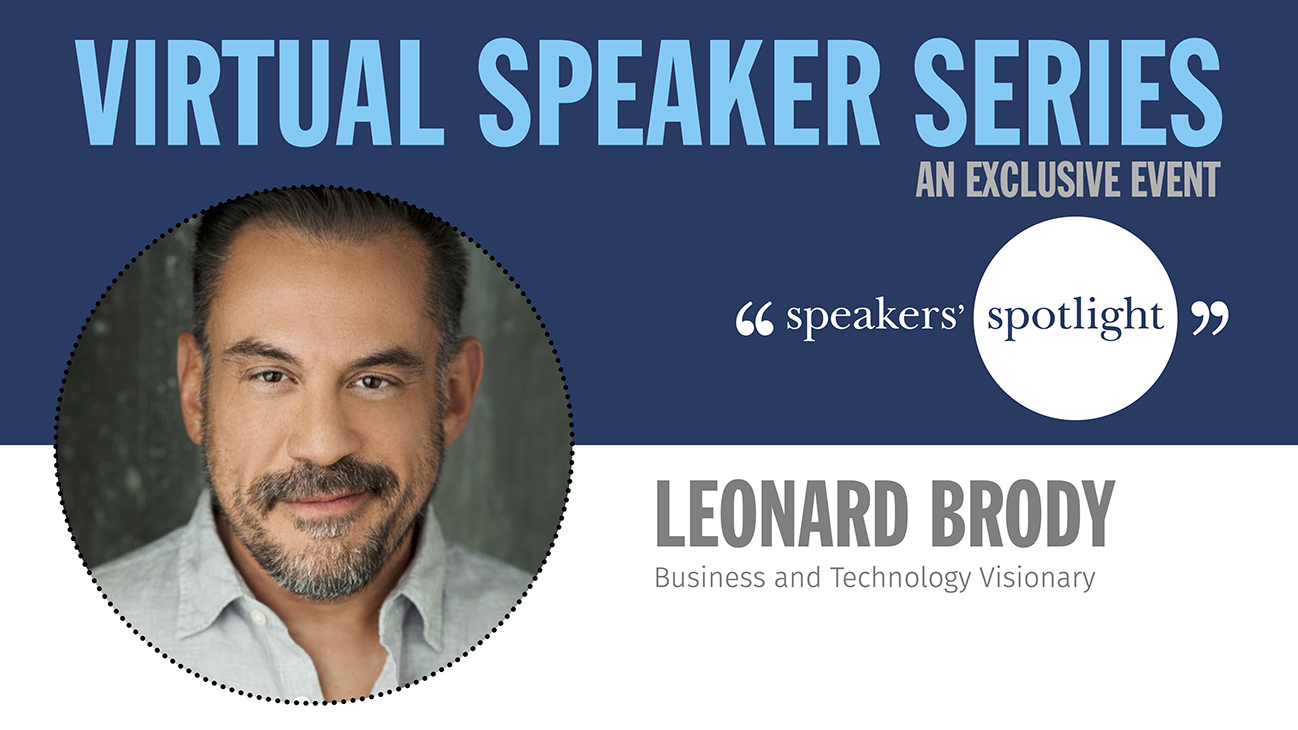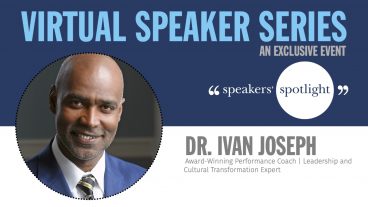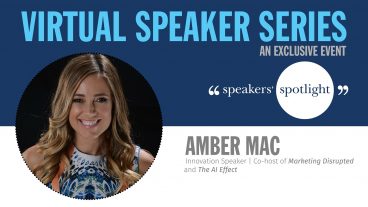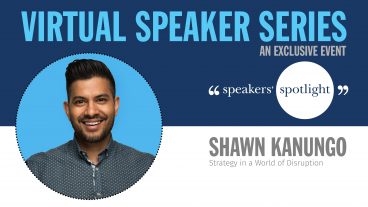Ever since the start of the pandemic nearly a year ago, most of us have lived in a state of reaction. Adapting to disruption in business, acclimating to the new normal, and trying to manage in a situation that feels static one day and constantly changing the next. It’s difficult enough to navigate as individuals, but taking this kind of short-term, reactive approach to business can be disastrous. So, how do we plan ahead when the future feels so uncertain?
Joining us for this week’s Virtual Speaker Series session, Leonard Brody showed why now is a great time to step back, look at the big picture, and try to shift our perspective. The award-winning entrepreneur, bestselling author, and renowned business visionary spoke about preparing to bounce back in a post-crisis world, pointing to examples from recent history to explain why periods like the one we’re in now are always followed by recovery and growth. Along the way he shared some important lessons that leaders and organizations can keep in mind to help them thrive as the economic and social dynamics shift in the coming months and years.
To start things off, Leonard took us back almost exactly 100 years to April 1919, when the Stanley Cup Finals were cancelled because the entirety of the Montreal Canadiens hockey team had come down with the Spanish Flu. That the world was in the midst of an outbreak of a deadly virus a century ago is not just a coincidence, but, Leonard said, part of a pattern. He said it’s important to look at our current situation and ask “is this unique?” Because, he said, in fact we can look at it as part of a cycle and one that we’ve seen many times over the past 300 years. These cycles “reset the human operating system” and cause massive disruption to how we live and work, what we buy, etc. But while they are disruptive there are nonetheless commonalities between them and as Leonard put it, “the patterns are definable, repetitive, and predictable.”
Looking for indicators of one of these reset cycles is the first step to better understanding how they impact us and how they will play out. Leonard said there are generally four causes of a cycle like this, sometimes alone or in combination: Financial (e.g. the 2007-2008 housing crisis), War/Conflict (World War II), Technology (the “dot com” bubble of the late 2000s), and Medical (the 1918 Spanish Flu). When one or more of these causes create a 35% shift in consumer and communication behaviour among people, Leonard said, that’s an indicator that we’re at the start of a reset cycle. In general, the stages of these reset cycles follow a pretty standard progression of a devaluation period (i.e. large scale social upheaval, economic downturn, unemployment, etc.) which lasts between 9 and 18 months, followed by an economic growth period which can last anywhere between 3 and 12 years.
For us in this moment, Leonard said that the COVID-19 pandemic has unique factors but overall there are many indicators that we’re once again entering into one of these standard cycles. He said that while we’re going through the devaluation period right now, it’s far too easy to get hyper-focused on this part of the cycle and lose sight of what is realistically to come in the next years. Leonard said we should ask ourselves, “How would you behave differently if you knew a growth period was coming?” This is the question that business and organization leaders should be keeping in mind as they plan for what’s to come.
As for what’s to come, we can’t know for sure, but Leonard once again pointed to some clear trends in the data that we have available. He said that we tend to snap back to what we knew before the start of a cycle, but some of the changes remain (the split usually looks something like 90% return to normal, 10% permanent change). As an example, Leonard believes that leisure travel will boom post-pandemic but that business travel will likely be reduced as we’ve adapted to remote working for such an extended period of time. To further extrapolate these trends, Leonard focused on three areas and offered predictions on how he see each heading in the coming years.
How We Buy
- We’ve passed the “crossover moment” between traditional in person shopping and e-commerce.
- It took us over a decade for online shopping to move from 5 to 15% of the market share. Since the start of the pandemic that share jumped to 25% in just 8 weeks.
- In a survey, 75% of people who have changed their buying habits during the pandemic expect that they will continue with this new behaviour when things normalize.
The Office
- The first offices were created as “factories of paper” intended to manage orders, invoices, and data. This is still the mould that many modern offices are based on and this moment has shown it is no longer a necessary part of doing business – in this traditional model.
- Leonard believes that we’ll see a continued shift of offices being the place where employees meet and gather, and home will be where work actually happens.
Live and In Person
- We should look to places that have managed to control COVID-19 as indicators of where things will head in the future. In countries like Australia and Vietnam where they have almost no spread of the disease, live events have come back to a degree almost identical to before the pandemic.
- What will change, according to Leonard, is that we’ll see a digital hybridization happening. What was before an after-thought will now be a viable secondary revenue source for conferences, concerts, and festivals.
Wrapping up, Leonard pointed to leadership as one of the most critical skill sets during these cycles. In his opinion, it’s the difference between organizations that thrive in the recovery and the ones that stumble and wither in the wake of a crisis. There is no singular path to success but having a clear vision and understanding the context that history has to offer can give you a huge advantage. Get ready to lean into the growth period of the recovery on the horizon and prepare to bounce back.
Recently named one of the top 30 up and coming management thinkers in the world, Leonard Brody is known as “a leader of the new world order”. He is an award-winning entrepreneur, venture capitalist, bestselling author, and a two-time Emmy-nominated media visionary. In his compelling, customized talks — for clients ranging from the United Nations to Visa and Pepsi — Leonard addresses the rapid pace of change, innovation, and disruption facing us all, and what to do about it.
Speakers’ Spotlight has been offering virtual presentations since 2009. We work with a range of speakers who are comfortable with presenting virtually on a variety of topics. If interested, contact us for more information.




